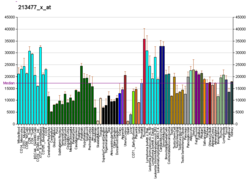Elongation factor 1-alpha 1 (eEF1a1) is a translation elongation protein, expressed across eukaryotes. In humans, it is encoded by the EEF1A1 gene.[5][6]
This gene encodes an isoform of the alpha subunit of the elongation factor-1 complex, which is responsible for the enzymatic delivery of aminoacyl tRNAs to the ribosome. This isoform (alpha 1) is expressed in brain, placenta, lung, liver, kidney, and pancreas, and the other isoform (alpha 2) is expressed in brain, heart and skeletal muscle. This isoform is identified as an autoantigen in 66% of patients with Felty's syndrome. This gene has been found to have multiple copies on many chromosomes, some of which, if not all, represent different pseudogenes.[7]
- ^ a b c GRCh38: Ensembl release 89: ENSG00000156508 – Ensembl, May 2017
- ^ a b c GRCm38: Ensembl release 89: ENSMUSG00000037742 – Ensembl, May 2017
- ^ "Human PubMed Reference:". National Center for Biotechnology Information, U.S. National Library of Medicine.
- ^ "Mouse PubMed Reference:". National Center for Biotechnology Information, U.S. National Library of Medicine.
- ^ Lund A, Knudsen SM, Vissing H, Clark B, Tommerup N (Sep 1996). "Assignment of human elongation factor 1alpha genes: EEF1A maps to chromosome 6q14 and EEF1A2 to 20q13.3". Genomics. 36 (2): 359–61. doi:10.1006/geno.1996.0475. PMID 8812466.
- ^ Wende H, Volz A, Ziegler A (Jul 2000). "Extensive gene duplications and a large inversion characterize the human leukocyte receptor cluster". Immunogenetics. 51 (8–9): 703–13. doi:10.1007/s002510000187. PMID 10941842. S2CID 20719684.
- ^ "Entrez Gene: EEF1A1 eukaryotic translation elongation factor 1 alpha 1".






